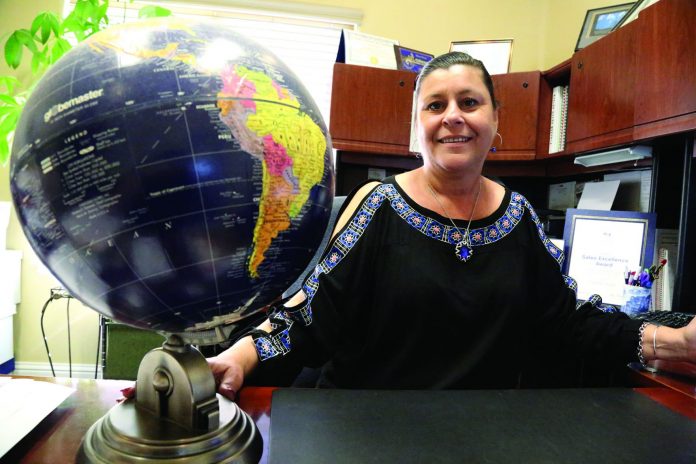They’re still out there, waving at us from the peripheries of our Google searches as we hunt for the cheapest and most efficient ways to book a dream vacation.
Across the nation, local mom-and-pop travel agents—once the first choice for wanderers—have dwindled in number since the world went online and Internet giants like Expedia, Priceline and Orbitz emerged, since AAA Travel went digital and Costco barged into the ring.
According to Airlines Reporting Corporation (ARC), there were 46,000 travel agents operating in the United States in the early 1980s. By 2013, that number had shrunk to 13,000.
What’s been displaced in a 21st-century world, say survivors of the industry, are those personal touches that can ensure a dream trip doesn’t morph into a living nightmare so many miles from home.
“We put out fires for our clients all the time,” said Cid Toste, who 17 years ago came to Gilroy to work for Caravelle World Travel, which has been owned since 1990 by Al and Vilma Pinheiro (Vilma is Cid’s sister). “We serve our clients from beginning to end, detail everything to expect and anticipate, and we’re right there, a phone call away, if something comes up.”
If, by contrast, a traveler books a trip through an online giant, any call for help—and every subsequent call—is likely to be fielded by a different agent at the other end of an 800 line. Not the best way to battle a five-alarm blaze, local agents say.
Kathy Dewett, of Morgan Hill-based Grande Destinations, happened to be traveling in Europe herself this past summer when she heard Lufthansa Airlines had just gone on strike. Dewett, a 29-year veteran of the industry, immediately contacted clients who, at that moment, were riding a shuttle to the airport.
“OK, this is what you’re going to do,” she told the frantic couple. “When you get there, one of you gets in line, and the other person gets on the phone. Double your chances to get out today on another carrier.
“Personal service … some people still want that, and those are the clients we want,” Dewtt said.
Many problems are routinely averted by an experienced personal travel specialist, said Alma Megeath, president of EcoAdventures, a Morgan Hill company that specializes in booking complex trips to Latin America for other travel agents. (EcoAdventures does not work directly with the public.)
“We catch a lot of mistakes, and there are a lot of mistakes to be made in packaging South America,” she said. “Classic example: Late-afternoon flights to Cusco [Peru], the gateway to Machu Picchu, or from Cusco to Lima, will be rained out 50 percent of the time during the rainy season.”
That’s not the kind of insight you’re likely to get from a sales associate on the 800 line, or the online chat window of an Internet travel giant, she says.
Want another? Megeath says anyone who gets booked lower than the 15th floor at Othon Palace, one of Rio de Janeiro’s best hotels, will have a vista of the building next door instead a breathtaking ocean view.
But the stakes can get much higher, according to Megeath, who says she and all of her agents have traveled extensively to the venues they routinely book.
Two travelers, both in their 60s, were arranging a river-rafting trip at Pacuare Lodge in Costa Rica. The inbound trip, Megeath knew from personal experience, is a fun, comfortable adventure over Class 2 and 3 rapids.
“At that point, you can either exit by land, or you can raft out,” she said. “Well, the rafting on the way out is over Class 4 and 5 rapids, which you can only do with extremely experienced river rafters. Neither of these 60-year-old people were experienced rafters, so we were able to prevent a very serious mistake.”
Independent travel agents also tend to be better informed about travel advisories, terrorism threats, virus outbreaks and other potential problems in certain regions.
A common misconception, according to local travel agents, is that clients will save great gobs of money with do-it-yourself Internet research. That’s usually not the reality, says Rich Perez Jr., who owns a Hollister-based franchise of Cruise One Dream Vacations.
“People like to go on Google and look for the best prices, and that’s probably our biggest competition,” said Perez, who became a travel agent 2½ years ago after 20 years as an engineer with AT&T. “But in today’s market, we have to be competitive, and what people often misunderstand is this: A travel agent usually doesn’t charge the customer anything. We’re paid a commission by the vendors we use, and because we have relationships with specific vendors, we can often guarantee our clients a better price.”
Travel agents also tend to know about upgrades and specials that are unavailable through online bookings, according to Nancy Diaz, who worked 20 years for AAA Travel before becoming an independent contractor last year, working with Morgan Hill’s Grande Destinations.
“When people would walk in wanting to go to Hawaii, I could say, ‘I’ve been to every island 10 times: These are the best specials, this one includes breakfast, this place has a fifth night free …’” she said.
“I don’t think people realize the value of a travel agent, and they don’t realize that they’re not paying any more money—they’re just getting the benefit of our expertise. We do all the research for you, and oftentimes we can save you money.”
Most mom-and-pop travel agents say the bulk of their clientele hails from an older demographic, but Perez says the younger generation seems to be rediscovering her slice of the industry.
“Older travelers tend to return to us because this has always been the way they’ve done it in the past. They’re comfortable with that,” he said. “With younger professionals, it’s more of a time issue. They’d rather turn the details over to somebody who has the experience to get them there, and give them exactly what they want.”












